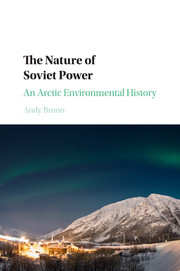Crossref Citations
This Book has been
cited by the following publications. This list is generated based on data provided by Crossref.
Kristensen, Lars
and
Burman, Christo
2017.
Soviet Estonian bicycle film: sport, nation and race narratives.
Studies in Eastern European Cinema,
Vol. 8,
Issue. 1,
p.
62.
Stawkowski, Magdalena E.
2017.
Radiophobia had to be reinvented.
Culture, Theory and Critique,
Vol. 58,
Issue. 4,
p.
357.
Elie, Marc
and
Ferret, Carole
2017.
Verte, la steppe ?.
Études rurales,
p.
64.
Sörlin, Sverker
2018.
Competing Arctic Futures.
p.
243.
Wormbs, Nina
2018.
Competing Arctic Futures.
p.
1.
Kalemeneva, Ekaterina
2018.
Competing Arctic Futures.
p.
213.
Lajus, Julia
2018.
Competing Arctic Futures.
p.
73.
Bruno, Andy
2018.
Climate history of Russia and the Soviet Union.
WIREs Climate Change,
Vol. 9,
Issue. 5,
Hardy, Jeffrey S.
2018.
Of pelicans and prisoners: avian–human interactions in the Soviet Gulag.
Canadian Slavonic Papers,
Vol. 60,
Issue. 3-4,
p.
375.
Allemann, Lukas
2018.
“I do not know if Mum knew what was going on”: Social reproduction in boarding schools in Soviet Lapland.
Acta Borealia,
Vol. 35,
Issue. 2,
p.
115.
Arzyutov, Dmitry V.
2019.
Environmental encounters: Woolly mammoth, indigenous communities and metropolitan scientists in the Soviet Arctic.
Polar Record,
Vol. 55,
Issue. 3,
p.
142.
Kalemeneva, Ekaterina
2019.
From New Socialist Cities to Thaw Experimentation in Arctic Townscapes: Leningrad Architects Attempt to Modernise the Soviet North.
Europe-Asia Studies,
Vol. 71,
Issue. 3,
p.
426.
Peterson, Maya K.
2019.
Pipe Dreams.
Wilson, Robert
2019.
Authoritarian Environmental Governance: Insights from the Past Century.
Annals of the American Association of Geographers,
Vol. 109,
Issue. 2,
p.
314.
Conterio, Johanna
2019.
Curative Nature: Medical Foundations of Soviet Nature Protection, 1917–1941.
Slavic Review,
Vol. 78,
Issue. 01,
p.
23.
Rindzevičiūtė, Eglė
2019.
Systems Analysis as Infrastructural Knowledge.
History of Political Economy,
Vol. 51,
Issue. S1,
p.
204.
Banerjee, Anindita
2020.
The Palgrave Handbook of Twentieth and Twenty-First Century Literature and Science.
p.
47.
Oslund, Karen
2020.
Not one North Pole, but many.
Metascience,
Vol. 29,
Issue. 2,
p.
305.
Brookes, Alec
and
Fratto, Elena
2020.
Towards a Russian Literature of the Anthropocene. Introduction.
Russian Literature,
Vol. 114-115,
Issue. ,
p.
1.
RINDZEVIČIŪTĖ, EGLĖ
2020.
SOVIET POLICY SCIENCES AND EARTH SYSTEM GOVERNMENTALITY.
Modern Intellectual History,
Vol. 17,
Issue. 1,
p.
179.





